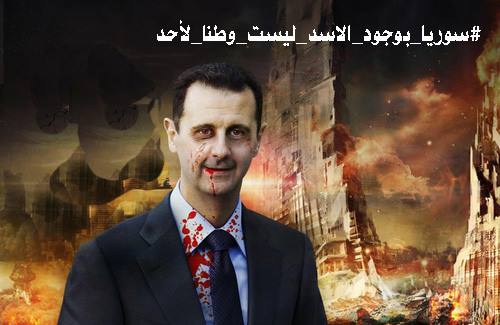The July 2012 law has been used to jail tens of thousands of regime opponents, armed and unarmed.
Meanwhile, in key rebel-backer Qatar, the prime minister urged the United Nations to impose a ceasefire to end Syria's conflict.
And Iran's president pledged during a trip to Ankara to work with Turkey, despite their opposing positions on the war.
Syrian state television said Monday's amnesty would cover all crimes committed before June 9, and would for the first time extend to those accused under the country's terrorism law.
The government has accused all those opposed to Assad's rule -- armed opposition fighters and peaceful activists alike -- of "terrorism".
State media cited Justice Minister Najem al-Ahmad as saying the decree was issued in the context of "social forgiveness, national cohesion calls for coexistence, as the army secures several military victories".
The amnesty is not the first time the government has offered clemency, but it is the first that pledges reduced sentences, and in some cases freedom, to regime opponents.
An estimated 100,000 people are in custody for activities related to the uprising which began in March 2011.
Some 18,000 of those detained have "disappeared", according to the Syrian Observatory for Human Rights.
The conflict began with peaceful anti-government demonstrations that were met with live fire by government forces, eventually prompting some in the opposition to take up arms.
In more than three years, upwards of 162,000 people have been killed.
- 'Dire prison conditions' -
Rights groups have described dire conditions, including torture and malnutrition in both prisons and detention facilities such as security service buildings.
On Monday, the Observatory reported that the families of 25 people held in regime facilities had been informed a day earlier that their relatives had died in detention.
Observatory director Rami Abdel Rahman told AFP the detainees had been tortured to death.
He also said the new amnesty should in theory cover many opposition activists being held.
"The amnesty should cover many opponents -- regardless of whether they bore weapons or not. Opponents of the regime are all considered terrorists," Abdel Rahman said.
The amnesty announcement comes after Assad won another seven-year term in Syria's first multi-candidate presidential vote.
Assad secured 88.7 percent of the vote in a ballot widely criticised by the international community and the opposition.
Voting was held only in regime-held areas, with many refugees barred from participating and election rules making it impossible for opposition figures abroad to stand.
The announcement also came as the International Committee of the Red Cross said it and Syria's Red Crescent made rare aid deliveries in rebel territory in the northern province of Aleppo.
The delivery comes a day after aid was delivered to two government hospitals and two others in rebel-held parts of Aleppo city.
The city has been divided between government control in the west and rebel control in the east since shortly after fighting began there in mid-2012.
In Doha on Monday, Sheikh Abdullah bin Nasser bin Khalifa al-Thani warned of the continuing threat to regional stability posed by Syria's conflict.
"It is incumbent on the international community, especially the (UN) Security Council, to act urgently and decisively to adopt a resolution imposing a ceasefire," he said.
Qatar has been a key backer of rebels in Syria, reportedly providing financial and military backing.
In Ankara, Iran's President Hassan Rouhani -- a key Assad ally -- pledged to work with rebel supporter Turkey, emphasising their opposition to extremists.
"Iran and Turkey, the two important countries in the region, are determined to fight against extremism and terrorism," he said.
Rouhani said his visit to Turkey "will undoubtedly be a turning point in the two countries' relationship".
------------------------------------------------------------------------------
Meanwhile, in key rebel-backer Qatar, the prime minister urged the United Nations to impose a ceasefire to end Syria's conflict.
And Iran's president pledged during a trip to Ankara to work with Turkey, despite their opposing positions on the war.
Syrian state television said Monday's amnesty would cover all crimes committed before June 9, and would for the first time extend to those accused under the country's terrorism law.
The government has accused all those opposed to Assad's rule -- armed opposition fighters and peaceful activists alike -- of "terrorism".
State media cited Justice Minister Najem al-Ahmad as saying the decree was issued in the context of "social forgiveness, national cohesion calls for coexistence, as the army secures several military victories".
The amnesty is not the first time the government has offered clemency, but it is the first that pledges reduced sentences, and in some cases freedom, to regime opponents.
An estimated 100,000 people are in custody for activities related to the uprising which began in March 2011.
Some 18,000 of those detained have "disappeared", according to the Syrian Observatory for Human Rights.
The conflict began with peaceful anti-government demonstrations that were met with live fire by government forces, eventually prompting some in the opposition to take up arms.
In more than three years, upwards of 162,000 people have been killed.
- 'Dire prison conditions' -
Rights groups have described dire conditions, including torture and malnutrition in both prisons and detention facilities such as security service buildings.
On Monday, the Observatory reported that the families of 25 people held in regime facilities had been informed a day earlier that their relatives had died in detention.
Observatory director Rami Abdel Rahman told AFP the detainees had been tortured to death.
He also said the new amnesty should in theory cover many opposition activists being held.
"The amnesty should cover many opponents -- regardless of whether they bore weapons or not. Opponents of the regime are all considered terrorists," Abdel Rahman said.
The amnesty announcement comes after Assad won another seven-year term in Syria's first multi-candidate presidential vote.
Assad secured 88.7 percent of the vote in a ballot widely criticised by the international community and the opposition.
Voting was held only in regime-held areas, with many refugees barred from participating and election rules making it impossible for opposition figures abroad to stand.
The announcement also came as the International Committee of the Red Cross said it and Syria's Red Crescent made rare aid deliveries in rebel territory in the northern province of Aleppo.
The delivery comes a day after aid was delivered to two government hospitals and two others in rebel-held parts of Aleppo city.
The city has been divided between government control in the west and rebel control in the east since shortly after fighting began there in mid-2012.
In Doha on Monday, Sheikh Abdullah bin Nasser bin Khalifa al-Thani warned of the continuing threat to regional stability posed by Syria's conflict.
"It is incumbent on the international community, especially the (UN) Security Council, to act urgently and decisively to adopt a resolution imposing a ceasefire," he said.
Qatar has been a key backer of rebels in Syria, reportedly providing financial and military backing.
In Ankara, Iran's President Hassan Rouhani -- a key Assad ally -- pledged to work with rebel supporter Turkey, emphasising their opposition to extremists.
"Iran and Turkey, the two important countries in the region, are determined to fight against extremism and terrorism," he said.
Rouhani said his visit to Turkey "will undoubtedly be a turning point in the two countries' relationship".
------------------------------------------------------------------------------









 Home
Home Politics
Politics











